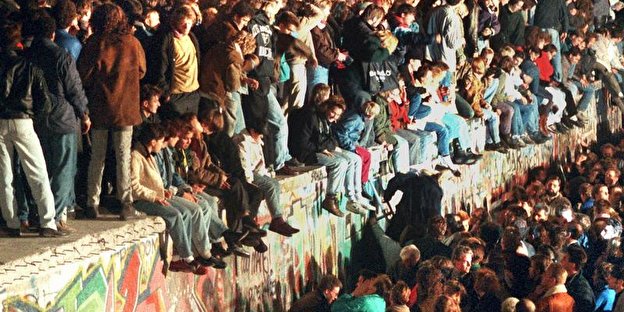A Wall: Is It Really The Answer To Society’s Problems
Unity after the fall of the wall Source: https://www.berlin.de/en/events/30-anniversary-fall-of-the-wall/
November 25, 2019
Thirty years ago, the Berlin wall fell as fast as it was built, bringing together people from both sides in a massive celebration with kissing, hugging, singing, cheering and crying.
Hammering and chipping at the wall themselves, Berlin residents were hungry for freedom, peace, unity, human rights and most of all a better life.
“Only today is the war really over,” someone spray painted on the wall that day.
Berlin was the only city physically divided by the Cold War, becoming the perfect example of how a country cannot be ruled. Repression of the insiders and exclusion of outsiders is not the solution for a better and more harmonious world.
However, we humans do not learn from our mistakes. As stated in The Business of Building Walls by Mark Akkerman, “Now, 30 years later, European countries have constructed about 1000 kilometers of border walls and fences, more than six times the length of the Berlin Wall, to keep out refugees and migrants.”
When World War II ended, Germany got split into the East with the Soviet Union (German Democratic Republic) and the West with the United States, Great Britain and France (Federal Republic of Germany). Throughout the years, the living conditions of each block became very different, which made millions and millions of Berliners flee from the communist and repressed East to the democratic West.
The two sides became more and more competitive and aggressive until East Berlin was so embarrassed by the endless flow of refugees escaping that they decided to build a wall —a 91-mile long wall of barbed wire and concrete that started building overnight and took everybody by surprise.
East Berlin thought that the only way to save themselves was to keep people inside and force them to live a suppressed life. No longer could people commute to their well-paid jobs, cross to see their families and loved ones, attend soccer games, operas and plays or simply go shopping.
The wall physically and mentally repressed Berliners in a way that no one will ever understand.
However, they forgot to look in the mirror and ask: what are we doing about it? If so many people are unhappy, seeking a way out and yearn for the “better place,” somewhere else then aren’t the ones in charge doing something wrong?
Tons of people put their lives at risk attempting to escape the East nightmare, such as flying in hot air balloons, digging tunnels, jumping out of windows close to the wall and driving through unfortified parts of it. Along the way, a couple of hundred people died while a large amount were killed for their attempts at freedom.
Life must have been very unbearable if so many were willing to defy death like that. But no, the system was not wrong, not even when the fall of the wall proved that unity was possible. And the system is still not wrong now, right?
“Worldwide, there has been an increase in forcibly displaced people from 43.3 million in 2009 to 70.8 million in 2018,” Akkerman’s report said. War, poverty, hunger, human rights violations, and repression force more and more refugees and migrants to leave their homes and try to seek a better place in Europe. And Europe welcomes them with miles and miles of walls.
Now, the problem is why do people desperately want to and have to leave their home countries and why don’t others want to help them?
“A wall is an answer to political insecurity inside the country, it’s not an answer to the problem it says it will be solving,” said Central Connecticut geography professor Elisabeth Valler stated. The adjunct, who is an expert on border fences.
Welcome to the 21st century, the one that does not learn from past mistakes and ignores the root of the problems.






